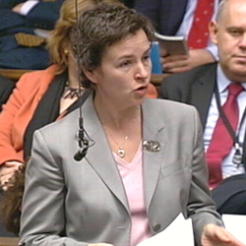The government’s anti-advocacy proposals could prevent research charities from sharing their expertise with parliamentary committees, the chair of an environment select committee has warned.
Mary Creagh, chair of the Environmental Audit Committee chair and Labour MP for Wakefield, made the comments in letters to the minister for the cabinet office, Matthew Hancock, and secretary of state for environment, food and rural affairs, Elizabeth Truss.
Creagh welcomed the goverment's pause on the proposals, pending a review. But she called for further clarification on the effect of the clause.
The proposals, if implemented, would have a “chilling effect on charities’ willingness to assist committees on their work", she said.
“Charities are an important source of evidence for Select Committee enquiries,” said Creagh. “This is particularly true in an area like the environment, where charities are often involved in monitoring and mitigating environmental damage”.
Creagh said she hoped the current review would “back up the government’s announcement on exemption of the major government-backed funding bodies – the research councils, national academies and Higher Education Funding Council for England – from the proposals”.
“There was a risk that the proposals, as they stood, would dissuade scientists and other academics from sharing their expertise with Select Committees, Ministers and other parliamentarians,” she said.
“I understand that Cabinet Office officials told NCVO it could be considered a breach of the clause for a charity in receipt of a grant to proactively submit evidence to a Select Committee inquiry,” Creagh said.
But she warned this would have “serious implications” for the Environmental Audit Committee if it was unable to rely on evidence from charities to scrutinise the government, because charities “believed – rightly or wrongly – that this could endanger their funding”, she said.
“This should be a central concern in the government’s review of its plans to implement this measure,” said Creagh.









